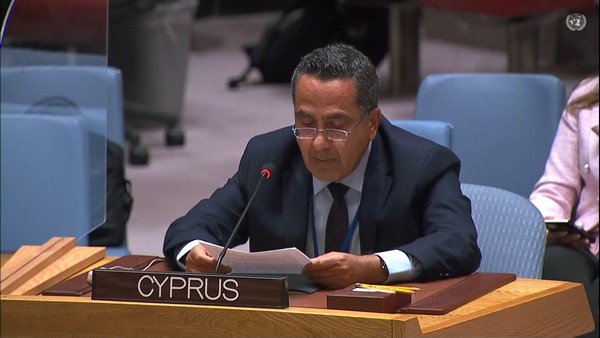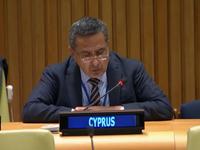Press Releases

21-05-2022 10:30
Statement by the Permanent Representative of Cyprus to the UN, Ambassador Andreas Hadjichrysanthou, at the Security Council Open Debate on Maintenance of International Peace and Security - Conflict and Food Security
New York, 19 May 2022
Mr President,
My delegation is thankful for this discussion and will make some remarks over and above those of the European Union.
While the conflict-hunger nexus is a long standing one, with millions having been affected for decades by hunger resulting from conflict, the FAO and the WPF report a significant increase in acute food insecurity in recent years, confirming at the same time that conflict is its main driver.
The challenge before us is two-pronged: hunger that threatens civilians in armed conflict, including as a warfare tactic, and hunger affecting populations beyond a particular conflict situation, due to the disruptions of the food systems caused by that conflict.
Through its Resolution 2417 in 2018, the Council condemned starvation as a weapon of war, reflecting the relevant obligation of states under International Humanitarian Law, while other related developments included the 2019 amendment of the Rome Statute, rendering the intentional use of starvation of civilians to be a war crime in non-international conflict as well.
The second challenge remains unaddressed. The conflict in Ukraine, in addition to affecting its own population, has exacerbated food shortages in other conflict and non-conflict situations. It comes on the heels of the disruptions caused by a severe pandemic and the worsening impact of climate change, compounding disruptions in the supply chains and increasing pressure on natural resources.
In the first instance, the Council must act to stop this conflict and to ensure that its humanitarian impact on other conflicts is not exacerbated and that the food insecurity it generates does not create new conflicts or unrest. Given the significant reliance on Ukraine’s grain and wheat, we support the efforts to reintegrate its agricultural production in the world markets to the benefit of the producing country and the populations most at risk.
Our planning, however, must incorporate solutions for a scenario in which food production comes to a halt as a result of conflict, something that cannot be excluded. Contingency planning could also seek to align grain stocks with country needs, with particular allocations made to existing conflicts afflicted by food crises.
In addition, the Global Crisis Response Group on Food, Energy and Finance, whose establishment and work we welcome, could go beyond the task of alleviating the current crisis and extrapolate lessons learnt to create a blueprint for a comprehensive strategy to prevent and tackle similar situations.
The analysis of the Group that 1.7 billion people live in countries whose economies are severely exposed to at least one of the three crises – food, energy, finance – shows how precarious the global situation is. The fact that a third of these people are already poor and 215 million are already undernourished, points to a particular failure to account for multiple vulnerabilities.
We support the global call for collective action on food security, based on solidarity and the prevalence of humanism in international cooperation.
I thank you.
(MG)
Relevant Press Releases

19-04-2024 16:42
PIO e-mail Αlerts service is suspended


04-04-2023 20:47
Photo Album – “They blew her up” play



